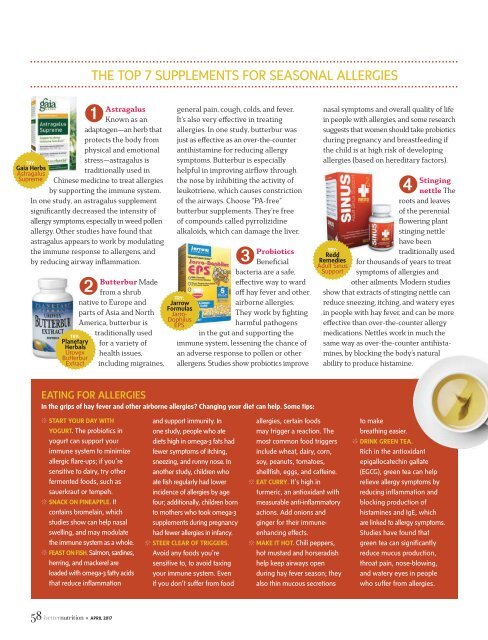magazine-pdf.org_13325_Better_Nutrition_April_2017_2
Create successful ePaper yourself
Turn your PDF publications into a flip-book with our unique Google optimized e-Paper software.
THE TOP 7 SUPPLEMENTS FOR SEASONAL ALLERGIES<br />
Astragalus<br />
Known as an<br />
adaptogen—an herb that<br />
protects the body from<br />
physical and emotional<br />
stress—astragalus is<br />
traditionally used in<br />
Chinese medicine to treat allergies<br />
by supporting the immune system.<br />
In one study, an astragalus supplement<br />
significantly decreased the intensity of<br />
allergy symptoms, especially in weed pollen<br />
allergy. Other studies have found that<br />
astragalus appears to work by modulating<br />
the immune response to allergens, and<br />
by reducing airway inflammation.<br />
TRY:<br />
Gaia Herbs<br />
Astragalus<br />
Supreme<br />
TRY:<br />
Planetary<br />
Herbals<br />
Urovex<br />
Butterbur<br />
Extract<br />
Butterbur Made<br />
from a shrub<br />
native to Europe and<br />
parts of Asia and North<br />
America, butterbur is<br />
traditionally used<br />
for a variety of<br />
health issues,<br />
including migraines,<br />
general pain, cough, colds, and fever.<br />
It’s also very effective in treating<br />
allergies. In one study, butterbur was<br />
just as effective as an over-the-counter<br />
antihistamine for reducing allergy<br />
symptoms. Butterbur is especially<br />
helpful in improving airflow through<br />
the nose by inhibiting the activity of<br />
leukotriene, which causes constriction<br />
of the airways. Choose “PA-free”<br />
butterbur supplements. They’re free<br />
of compounds called pyrrolizidine<br />
alkaloids, which can damage the liver.<br />
Probiotics<br />
Beneficial<br />
bacteria are a safe,<br />
effective way to ward<br />
off hay fever and other<br />
airborne allergies.<br />
They work by fighting<br />
harmful pathogens<br />
in the gut and supporting the<br />
immune system, lessening the chance of<br />
an adverse response to pollen or other<br />
allergens. Studies show probiotics improve<br />
TRY:<br />
Jarrow<br />
Formulas<br />
Jarro-<br />
Dophilus<br />
EPS<br />
nasal symptoms and overall quality of life<br />
in people with allergies, and some research<br />
suggests that women should take probiotics<br />
during pregnancy and breastfeeding if<br />
the child is at high risk of developing<br />
allergies (based on hereditary factors).<br />
TRY:<br />
Redd<br />
Remedies<br />
Adult Sinus<br />
Support<br />
Stinging<br />
nettle The<br />
roots and leaves<br />
of the perennial<br />
flowering plant<br />
stinging nettle<br />
have been<br />
traditionally used<br />
for thousands of years to treat<br />
symptoms of allergies and<br />
other ailments. Modern studies<br />
show that extracts of stinging nettle can<br />
reduce sneezing, itching, and watery eyes<br />
in people with hay fever, and can be more<br />
effective than over-the-counter allergy<br />
medications. Nettles work in much the<br />
same way as over-the-counter antihistaability<br />
to produce histamine.<br />
EATING FOR ALLERGIES<br />
In the grips of hay fever and other airborne allergies? Changing your diet can help. Some tips:<br />
"!<br />
"!<br />
"!<br />
START YOUR DAY WITH<br />
YOGURT. The probiotics in<br />
yogurt can support your<br />
immune system to minimize<br />
allergic flare-ups; if you’re<br />
sensitive to dairy, try other<br />
fermented foods, such as<br />
sauerkraut or tempeh.<br />
SNACK ON PINEAPPLE. It<br />
contains bromelain, which<br />
studies show can help nasal<br />
swelling, and may modulate<br />
the immune system as a whole.<br />
FEAST ON FISH. Salmon, sardines,<br />
herring, and mackerel are<br />
loaded with omega-3 fatty acids<br />
that reduce inflammation<br />
"!<br />
and support immunity. In<br />
one study, people who ate<br />
diets high in omega-3 fats had<br />
fewer symptoms of itching,<br />
sneezing, and runny nose. In<br />
another study, children who<br />
ate fish regularly had lower<br />
incidence of allergies by age<br />
four; additionally, children born<br />
to mothers who took omega-3<br />
supplements during pregnancy<br />
had fewer allergies in infancy.<br />
STEER CLEAR OF TRIGGERS.<br />
Avoid any foods you’re<br />
sensitive to, to avoid taxing<br />
your immune system. Even<br />
if you don’t suffer from food<br />
"!<br />
"!<br />
allergies, certain foods<br />
may trigger a reaction. The<br />
most common food triggers<br />
include wheat, dairy, corn,<br />
soy, peanuts, tomatoes,<br />
shellfish, eggs, and caffeine.<br />
EAT CURRY. It’s high in<br />
turmeric, an antioxidant with<br />
measurable anti-inflammatory<br />
actions. Add onions and<br />
ginger for their immuneenhancing<br />
effects.<br />
MAKE IT HOT. Chili peppers,<br />
hot mustard and horseradish<br />
help keep airways open<br />
during hay fever season; they<br />
also thin mucous secretions<br />
"!<br />
to make<br />
breathing easier.<br />
DRINK GREEN TEA.<br />
epigallocatechin gallate<br />
(EGCG), green tea can help<br />
relieve allergy symptoms by<br />
reducing inflammation and<br />
blocking production of<br />
histamines and IgE, which<br />
are linked to allergy symptoms.<br />
Studies have found that<br />
green tea can significantly<br />
reduce mucus production,<br />
throat pain, nose-blowing,<br />
and watery eyes in people<br />
who suffer from allergies.<br />
#$ • APRIL <strong>2017</strong>


















